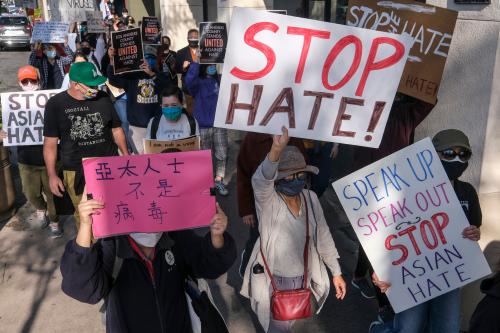If you want more content like this, subscribe to our newsletter.
This week in Class Notes:
- Universal preschool improves graduation rates, increases test scores, and reduces school suspensions.
- Summer Youth Employment Programs not only reduce arrests and improve health outcomes – they’re scalable too.
- School spending cuts caused by the Great Recession reduced test scores and college-going rates, especially in poorer areas.
- This week’s top chart shows that ideological divisions over cultural issues are wider in the U.S. than in some European countries.
- Adam Harris shows how HBCUs have long been deprived of funding in this week’s choice op-ed.
- Check out our latest piece on why we should tax carbon and consumption instead of middle class income.
- For your calendar: Attend upcoming webinars on worker retraining programs, emergency rental assistance, and the effects of Biden’s corporate tax proposals.
- Listen to my conversation with Martha Nussbaum on #MeToo and sexual assault.
Universal preschool improves graduation rates, increases test scores, and reduces school suspensions
Over the last two decades, the share of 4-year-olds enrolled in state-funded preschools has risen from 14% to 34%. Early childhood education is seen by many policymakers as a powerful tool for reducing socioeconomic disadvantages. But is it? In their analysis of the long-term impact of a universal preschool program, Guthrie Gray-Lobe, Parag A. Pathak and Christopher R. Walter suggest that the answer is yes. They follow 4,000 children who applied to Boston’s centralized public preschool program between 1997-2003 and observe educational and behavioral outcomes using National Student Clearinghouse data. Boston’s lottery “tie-breaker” system, which randomly admits students when capacity is limited, allows the authors to study causal effects. Preschool enrollment increases the likelihood of graduating from high school by 6%, of taking the SAT by 9%, and attending college by 8%. It also increases the probability that a student will score in the top quartile of the distribution on the SAT. Preschool attendance also reduces the frequency of suspension and the likelihood that a student will be incarcerated during high school. Interestingly, boys see significantly larger benefits than girls, in both academic and behavioral outcomes.
Summer Youth Employment Programs not only reduce arrests and improve health outcomes – they’re scalable too
Scaling up social policy interventions is a permanent challenge. Oftentimes, an intervention that has been shown to work in one context does not replicate that success when implemented elsewhere. To better understand the scalability of social programs, Sarah Heller studies two Summer Youth Employment Programs (SYEP) with distinct characteristics – one in Chicago and the other in Philadelphia. SYEPs offer paid employment opportunities to at-risk, high-school-age youths during summer months. The Chicago and Philadelphia SYEP programs differ in duration, job type, pay, training style, and target community. Nonetheless, Heller finds similar main effects for both programs. Both SYEPs reduce arrests among participating youths by around 50-65% in the year following the program. Among cohorts with observable medium-term data, arrests decline in years 2 and 3 after the program as well. The similarity in outcomes, despite variations in program design, suggest that SYEPs may be easier to scale than other initiatives. Notably, program effects are heterogeneous; the more at-risk a participant is, the larger the program effects, suggesting that SYEPs that are implemented in extreme high-risk areas may see even larger positive effects.
School spending cuts caused by the Great Recession reduced test scores and college-going rates especially in poorer areas
The Great Recession brought about a 7% decline in per-pupil spending in public K-12 schools across the country. What were the causal effects of these cuts on education outcomes? Time trends offer suggestive evidence that cuts damaged academic achievement. C. Kirabo Jackson, Cora Wigger, and Heyu Xiong note that the onset of the recession marks the first time in 50 years that national test scores in math and reading declined. To isolate the effects of school spending cuts from other factors, Jackson and his co-authors exploit the variation in school funding cuts across states, using data from the National Assessment of Educational Progress and the Integrated Postsecondary Education Data System. They find that students exposed to spending cuts had lower test scores and lower college-going rates. Notably, students in high-poverty areas were hit harder by spending cuts than those in more affluent areas. College-going rates dropped mostly for schools that are non-selective, have more part-time students, and serve mostly minority populations.
Top chart: Ideological divisions over cultural issues are wider in the US than in some European countries
This week’s top chart shows that Americans are significantly more divided along ideological lines than people in the United Kingdom, France and Germany on a wide range of cultural issues. The survey, conducted in 2020, finds for example that Americans with different political orientations strongly disagree about whether it is a problem that people “see racial discrimination where it does not exist.”

Choice opinion: HBCUs have long been deprived of funding – the Biden administration is working to change that
“A recent audit in Tennessee revealed that, from 1957 to 2007, the state failed to meet its legal obligation to match the federal land-grant funding of its Black college, Tennessee State University, by more than $500 million. According to one estimate, Maryland over the past century shorted its four public Black colleges by at least $2.73 billion—more than the sum the Biden administration has targeted to similar institutions across the entire country. The money that would be required to address the deliberate disinvestment in Black colleges is eye-popping. But as Katherine Wheatle, a federal-policy analyst at the Lumina Foundation, an education nonprofit, told me, ‘Racism is expensive, and we’re starting to see the bill.’,” explains Adam Harris.
Self-promotion: Tax carbon and consumption, not middle class income
In A New Contract with the Middle Class, Isabel Sawhill and I document the numerous ways in which the American middle class is falling behind — not least in terms of income. So what’s to be done? In this summary article, Ariel highlights our key proposal: eliminating income taxes by raising the standard deduction for most middle-class families — specifically, any married couple making less than $100,000 a year or any single person making less than $50,000. To make up some of this lost revenue, a carbon tax and a consumption tax should be introduced. A carbon tax starting at $25 a ton would generate roughly $1.4 trillion over a decade and help the U.S. reach its ambitious environmental goal of cutting its global warming emissions in half by the end of the decade. Additionally, a well-designed value-added tax (VAT), paired with a refundable tax credit, could both generate much-needed revenue (around $240 billion a year) and also be equitable.
For your calendar: worker retraining programs, emergency rental assistance, and the effects of Biden’s corporate tax proposals
Worker retraining and transitions in a dynamic economy
1:00 – 2:30 PM EDT on Tuesday, May 25, 2021
American Enterprise Institute
What Can We Learn from Communities About Equitably Providing Emergency Rental Assistance?
3:00 – 4:30 PM EDT on Tuesday, May 25, 2021
Urban Institute
What Are the Effects of the Biden Administration’s Corporate Tax Proposals?
9:30 – 12:00 PM EDT on Wednesday, June 9, 2021
Tax Policy Center
Listen to my conversation with Martha Nussbaum on #MeToo and sexual assault

In the latest episode of my new podcast, Dialogues, I talked to Martha Nussbaum about the #MeToo movement, how pride underpins sexism, how to fairly adjudicate sexual assault on college campuses, animal rights, and much more besides. Listen here. And buy Martha’s new book, Citadels of Pride: Sexual Abuse, Accountability, and Reconciliation.
The Brookings Institution is committed to quality, independence, and impact.
We are supported by a diverse array of funders. In line with our values and policies, each Brookings publication represents the sole views of its author(s).








Commentary
Class Notes: Universal preschool, ideological divisions in the US, and more
May 20, 2021